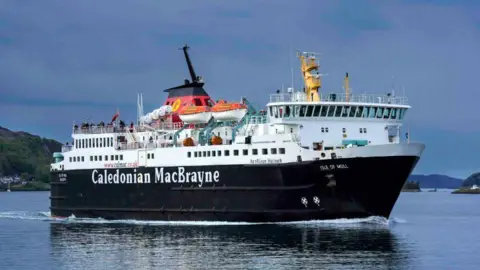CalMac directly awarded new ferry service contract
 Getty Images
Getty ImagesThe contract to run Scotland's west coast ferry services in future has been directly awarded to the existing publicly-owned operator CalMac Ferries Ltd.
The Scottish government said the service would now be focused on a "public service model" instead of being run on a commercial basis.
The latest contract for the Clyde and Hebridean Ferry Service (CHFS) had been due to expire last September but was extended by a year.
Ministers had indicated that a direct award, without a competitive tender, was their preference, but they needed more time to ensure this could be done without a legal challenge.
No details of the contract's value or duration were given, but the previous eight-year contract for the heavily-subsidised ferry service was worth £975m.
One estimate has suggested a subsidy of £3.7bn over 10 years would be required.
CalMac is the UK's biggest ferry operator and has held the most recent contract to run the routes since 2016, serving 50 destinations.
But the firm has struggled in recent years to maintain services with an ageing and increasingly unreliable fleet which it leases from another government-owned firm.
Since 2007 the ships and some of the harbours it relies on have been owned by Caledonian Maritime Assets Ltd or CMAL, in a division designed to comply with EU competition rules.
Delays in replacing the older vessels, in part due to the problems with two new dual-fuel ferries ordered a decade ago, have stretched the service almost to breaking point, with many vessels beyond their expected service life.
Transport Secretary Fiona Hyslop confirmed the direct award in a written parliamentary answer, saying it signalled a new approach to ferry services.
She said: "This direct award fundamentally changes the ethos of the service by shifting from a commercial arrangement to a model more focused on the delivery of a public service engaged on the particular needs of the communities it serves.
"I fully expect the direct award to be a catalyst for positive change across the Clyde and Hebrides network, based on a more efficient, flexible model of delivery that fully reflects community interests."
 PA Media
PA MediaCalMac chief executive Duncan Mackison welcomed the emphasis on treating the Clyde and Hebridean routes as a public service and promised improvements.
He said: "During the extension period for the current contract, we recognised the need for change and are already driving change through the expansion of local teams, enhanced community engagement and improved responsiveness to local requirements.".
The Clyde and Hebridean Ferry Service contract is offered as a single "bundle" which the government says has the advantages of protecting less profitable lifeline routes and delivering economies of scale.
Critics of that choice have argued that unbundling certain routes and allowing competitive tender would encourage efficiencies.
The Northlink routes to Orkney and Shetland are currently operated by privately-owned Serco, with the government setting fares and service levels and paying the firm a subsidy to make up the difference between costs and revenue.
Wider reform call
Trade unions have backed the direct award of the west coast routes to the existing publicly-owned operator, with the RMT union calling for a "People's CalMac".
The unions have, however, been critical of the government's approach to ferry procurement.
The GMB union contrasted the direct award to CalMac with the recent £160m small ferries contract that went to tender and was won by a Polish firm rather than the nationalised Ferguson shipyard in Port Glasgow.
GMB Scotland general secretary Louise Gilmour said the government should now merge CalMac and CMAL to encourage a more joined-up approach focused both on supporting both ferry services and Scottish industry.
"Our islands' need for reliable and modern ferries can drive a healthy and secure shipbuilding and maritime sector," she said.
"It seems an obvious ambition with significant economic benefits and one that should not be beyond Scotland's capabilities to deliver."
The Scottish Conservatives said the direct award provided continuity but that CalMac would continue to struggle unless the government provided it with a resilient fleet.
The party's transport spokeswoman Sue Webber said: "Islanders have been betrayed by the SNP time and time again, and any ferry provider is only as good as the fleet it has to work with."
